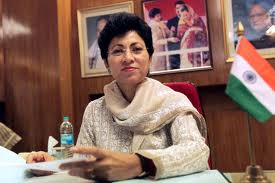 The Ministry of Housing and Urban Poverty Alleviation (M/MoHUPA), Government of India has organized a two day International conference on “Inclusive Urban Planning” on 18-19th February 2013 at Vigyan Bhavan, New Delhi.
The Ministry of Housing and Urban Poverty Alleviation (M/MoHUPA), Government of India has organized a two day International conference on “Inclusive Urban Planning” on 18-19th February 2013 at Vigyan Bhavan, New Delhi.
The International Workshop on “Inclusive Urban Planning” was inaugurated by Kumari Selja, Hon’ble Minister for Social Justice & Empowerment, Government of India. In her inaugural address, Hon’ble Minister highlighted the social and cultural dimensions of exclusionary outcome of traditional planning processes and spoke of the need to integrate the marginalized in the spatial planning processes, giving particular emphasis to the aged and the disabled. She hoped that deliberations would come up with solutions both at policy and programme levels. In his introductory remarks Mr. Arun Kumar Mishra, Secretary, MoHUPA statistics which highlighting impact of non inclusive planningon disparity in Income, Space, Opportunities, Food, Health and education, all of which demand appropriate policy fixes. In this context he highlighted the several game changer initiatives & reforms carried out by MoHUPA such as JNNURM, Affordable Housing for the Urban Poor, Rajiv Awas Yojana, National Urban Livelihoods Mission, reservation of land/FAR for EWS&LWG, according property rights to slum dwellers, earmarking funds for basic services to urban poor which aid the cities to be more responsive and cater to the needs of urban poor in particular. Ms. Emma Spicer, Dy.Head, DFID India complimented MoHUPA for organizing the conference and highlighted the commitment of DFID for improving the lives of urban poor and providing support to such initiatives.
The opening session reflected at India’s current urban planning models, of planning visions, strategies and tools, and at the institutional form of planning institutions in Indian cities. The discussion led to understanding structures and processes of planning, as they exist in India today, as also the exclusionary impact of these structures and processes. there by suggesing changes in planning policy, tools and strategies, and institutional forms that would make planning more inclusive. The session was chaired by Mr.K.C.Sivaramakrishnan, Center for Policy Research . The speakers include Mr. K.T.Ravindran, Former Dean, SPA, Prof. Dinesh Mehta, CEPT, Prof.Anna Rubbo, Earth Institute and Prof.Gitam Tiwari, IIT, Delhi
The second session focused on inclusionary planning models practiced in cities outside India, and reflected at processes and outcomes linked to the choice of planning model adopted from societies and nations in transition, including from South Africa, Brazil, China and East Asian countries. The deliberations deepened the understanding of providing a canvas of options for Indian policy makers. The session was chaired by Mr. Arun Maira, Member, Planning Commission and the speakers include Prof. Jeroen Klink, Professor, Federal University of ABC, Brazil, Prof. Susan Parnell, Professor, African Center for Cities, University of Cape Town, South Africa, Ms. Giovanna Beltrao, Human Settlement and Community Development Expert, Canada, Mr. Earl Kessler, Shelter and Urban Programs Expert, USA, Prof. David Dowall and University of California, Berkeley and Mr. Peter Ellis, World Bank representing diverse international experience and perspectives from large cities, and
The third session reflected on ‘governance’ of urban planning, looking at laws, institutions and regulatory rules that govern the urban planning process. The session also discussed legal, institutional and regulatory challenges for inclusive planning, the implications on urban poverty. The session also deliberated on changes which are technically and politically feasible in the legal, institutional and regulatory framework for further inclusiveness. The session was chaired by Dr. Isher Judge Ahluwalia, Chairperson, ICRIER and the speakers include Mr. Geoffrey Payne, Housing and Urban Development Expert, Mr. V. P. Baligar, CMD, HUDCO, Dr. Jonathan Beard, Finance and Economics Expert, ICF-GHK, Hong Kong and Prof. Darshini Mahadevia, CEPT
The fourth session critically examined the different plans and policies that evolved through Government schemes and programmes in India. It identified gaps and disconnects between policies, plans and urban investments and urban issues. . as well as the institutional challenges that perpetuate these gaps and disconnections. The session was chaired by Prof. S R Hashim, former member, Planning Commission, and the speakers include – Prof. Kunal Sen, Professor, University of Manchester, Mr. John Gladki, Land Use and Policy Planning Expert, Canada, Mr. Keiichi Tamaki, Urban Development Specialist, ADB, and Mr. Narayanan Edadan, Municipal Finance Expert.
During the valedictory session, Mr.Ajay Maken, Hon’ble Minister for Housing & Urban Poverty Alleviation (MoHUPA) thanked Prof OP Mathur for having drafted a very meaningful and succinct Declaration and also stated that Ministry would endevour to integrate these principles in the reform agenda and schemes of his Ministry. He also highlighted the fact that slum dwellers are excluded from many of the necessities of an urban life, including political voice, secure and good-quality housing, education, affordable health services, transportation and most importantly and accessibility to credit. He highlighted the various initiatives of MoHUPA, such as JnNURM, Affordable Housing in partnerships, Rajiv Awas Yojana, National Urban Livelihoods Mission which aim at reaching out to the urban poor in more participatory and inclusive manner.
He said that conference has deliberated upon anddrawn lessons on many aspects of urban planning identifying the need for more participatory and inclusive approaches and practices and proposed solutions for various challenges. He hoped that during this conference the planners, policy professionals, bureaucrats technocrats and other stakeholders have imbibed key lessons, perspectives and policy designs that would work towards making our cities more inclusive. Prof.OP.Mathur, NIUA, summed up the two day conference proceedings and way forward Marking the occasion, with the conclusions drawn and affirmation of commitment to a set of guiding principles, a “Delhi Declaration on Inclusive Urban Planning” was adopted by the Conference.
The two day International Conference was well attended by national and international level experts on urban planning & poverty alleviation, officials from Central and state government, Municipal Commissioners, international donor agencies and representatives from academic, training and research institutions.
